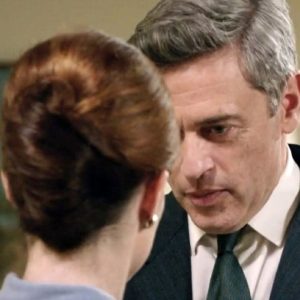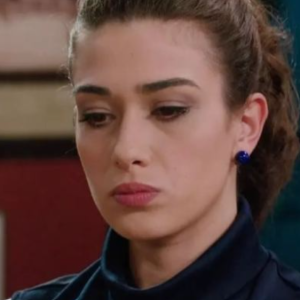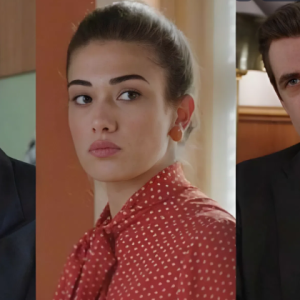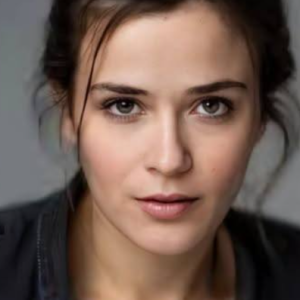As summer fades and the melancholic grey skies of September return to Milan, a chilling new chapter is set to unfold at the prestigious Il Paradiso delle Signore. The air within its elegant walls is thick with a tense silence, a calm before an impending storm that will shatter the lives of everyone connected to the beloved department store. This autumn, nothing will ever be the same.
While familiar faces return with customary smiles and embraces, a mysterious new figure stalks the opulent corridors: Fulvio Rinaldi. With an enigmatic gaze and refined manners, Fulvio’s origins and true intentions remain a profound mystery. Yet, one thing is undeniably clear: his arrival will unleash a tempest of chaos and expose long-buried secrets.
The Arrival of Fulvio Rinaldi: Equilibrium Shatters
Fulvio Rinaldi is no ordinary newcomer. He moves with the controlled grace of a man accustomed to power, exuding an elegance that commands respect without a single raised voice. His impeccable attire and steady gaze hint at a deeper purpose, one that will soon begin to unravel the fabric of Il Paradiso. His initial visit to the department store is far from casual; he observes every detail with an expert eye – the saleswomen, the displays, the internal dynamics between colleagues. But his keenest attention is reserved for Adelaide di Sant’Erasmo.
Their first encounter is charged with unspoken tension. He offers her a subtle half-smile, while her gaze is filled with an unsettling curiosity. “Contessa,” he simply utters, and that single word is enough to send tremors through Adelaide, making her realize this man is no ordinary acquaintance. There’s an unnerving familiarity in his gaze, a knowledge he shouldn’t possess.
Marcello is the first to sense the profound disruption. Always attuned to the delicate balance within Il Paradiso, he instinctively feels that Fulvio’s arrival isn’t merely a new collaboration or a wealthy client. Fulvio seems to know too much, asking subtle questions and possessing an uncanny understanding of internal dynamics that an outsider simply shouldn’t. Most unsettling of all, he appears to be in no hurry; he has come to stay.
Even Vittorio Conti, returning to Milan with his usual charisma, perceives the shift in atmosphere. He begins to investigate the newcomer, but every attempt to uncover Fulvio’s past leads to a dead end. Fulvio is an elegant enigma, as reserved as an investigator, and indeed, he seems more interested in the people of Il Paradiso than its products.
Adelaide’s Hidden Torment
The true earthquake, however, rumbles beneath Adelaide’s icy façade. Already tested by the previous season’s events and the fragile equilibrium with her daughter, Odile, the Contessa cannot afford any new shocks. Yet, each encounter with Fulvio deeply disturbs her, evoking a memory or perhaps a person from her past. Who or what is he connected to?
Fulvio subtly integrates himself among the employees, appearing gentle and affable but never truly open. His words are carefully chosen, each phrase meticulously crafted. This unnatural composure begins to unnerve the saleswomen, particularly Maria and Irene, who start to question his true role. Is he merely a new supplier, or is he searching for something else, someone else?
The answers begin to surface during a more intimate meeting between Fulvio and Adelaide. Fulvio utters an ambiguous phrase: “Sometimes the most painful truths are those we don’t have the courage to face.” Adelaide is stunned; no one has ever dared to speak to her like that. But Fulvio does not back down, pressing on: “I have no intention of remaining silent, not this time.” What does this man truly know? What is his connection to the Contessa’s past? And most importantly, what ties him to Odile?

In the skies above Milan, the first dark clouds begin to gather, reflecting Adelaide’s internal turmoil as she grapples with the immense weight of the truth. Her life has always been a carefully constructed edifice of appearances, elegance, control, and power. But beneath her cold exterior and calculated words lies an ancient wound, an unresolved sorrow. Now, that sorrow has a name: Odile.
Odile is the daughter Adelaide was never able to raise as she desired, a child she protected from afar by concealing the most important truth of her life. For years, Adelaide chose silence, convinced it was the purest form of love. But that silence has become a prison, and now, every glance from her daughter is a blade piercing her heart.
Upon her return to Milan, Odile is different: more mature, more self-assured, and, crucially, more suspicious. She senses something is amiss. Her mother seems restless, distant, and unapproachable during crucial moments. And when Fulvio Rinaldi enters her life with disarming ease, her doubts multiply. Adelaide observes the budding complicity between Fulvio and Odile with a mixture of fear and jealousy. This man seems to know too much, and the Contessa fears one thing above all: that he has come to reveal what she has kept hidden for an entire lifetime.
Meanwhile, Umberto Guarnieri, Odile’s true father, endures days of profound unease. After Adelaide’s shocking revelation, delivered through tears and memories of a lost life, the Commendatore has been overwhelmed by a paternal instinct he never knew. Initially, he wanted to rush to Odile, embrace her, and tell her everything. But then fear took hold—fear of losing her before he could even connect with her, fear of shattering the image she had built of herself, fear of breaking something already fragile. And so, he chose to remain silent once more. But the time for lies is over, and Fulvio seems determined to force everyone to confront the truth.
One afternoon, as Odile arranges files in the atelier office, Fulvio approaches her, offering a coffee with a gentle smile. They make small talk, but suddenly, the conversation takes an unexpected turn. “You two are very much alike, you know?” Fulvio says, his tone calm yet penetrating. “Alike whom?” Odile asks. “Your father. Your real one.”
Odile is speechless. She tries to smile, to pretend it’s a joke, but something stirs within her—an intuition, a shiver. When she asks for an explanation, Fulvio changes the subject, leaving her in suspense. But the damage is done. That very evening, Odile confronts Adelaide, asking if there’s anything she doesn’t know about her birth, her childhood. Adelaide denies it, as she always has, but this time, her hands tremble, and her gaze is lowered. Odile sees it, she feels it.
Umberto is tormented, walking through the corridors of Il Paradiso like a man in exile. He avoids Odile but watches her from afar. Every word he addresses to her is filtered through guilt. Every smile is forced. Even Flora, his partner, begins to notice an unease she cannot explain.
Adelaide and Umberto meet in secret. Their dialogue is brief, tense, and filled with silences. She is convinced that Fulvio’s presence is accelerating what they both fear: the collapse of the house of lies they have built. “He wants to know, he wants to take away the trust you have in me,” Adelaide whispers, her voice broken. “Perhaps it’s right,” Umberto replies. “We cannot protect her by lying forever.” But Adelaide is not ready. Not yet.
Meanwhile, Fulvio continues his subtle machinations. He never says too much, but he says enough to sow doubt, to dig furrows. He doesn’t attack directly but moves the pieces like a chess player always three moves ahead. Who is this man, truly? A mere acquaintance from the past, a friend of the Sant’Erasmo family? Or perhaps someone connected to Odile more than anyone can imagine? The answers will come, and when they do, they will be like an avalanche.
As each day passes, Odile inches closer to the truth, and Adelaide feels the ground beneath her crumbling. What has been said cannot be unsaid, lies do not last forever, and love, if founded on deceit, ultimately destroys everything.
Fulvio Drops the Mask: The Time for Truth
The September breeze carries a change that everyone feels, but few can explain. At Il Paradiso delle Signore, every gesture, every glance seems laden with meaning. At the center of this slow emotional earthquake is always Fulvio Rinaldi. As the days pass, Fulvio no longer merely observes; he acts. He naturally infiltrates the intimate spaces of the protagonists, pushing each one to their breaking point.
With Odile, he is increasingly present, offering a listening ear, support, and advice. He never presents himself as someone who has all the answers, but his questions always hit home. “Have you never wondered why your mother avoids certain conversations? Some things are felt, even if they are not said. Sometimes family is where you lie best.” These brief phrases, dropped casually, unleash storms in Odile’s heart.
Adelaide, meanwhile, lives with growing nervousness. The more she tries to remain impassive, the more fragile she appears. Her silences lengthen, her responses become sharp, her smiles forced. Even Matilde and Flora notice something, but no one dares to ask her directly. Every encounter with Fulvio is a test of endurance for Adelaide. He challenges her with his eyes, with his silences laden with innuendo, and she, though seemingly holding her own, returns to her office each time with a churning heart and cold hands. Fulvio knows, she is certain. And the thought that he might be the one to reveal the secret to Odile terrifies her more than anything.
Umberto Guarnieri has reached his breaking point. Each passing day, he feels the weight of the unspoken truth growing on his shoulders. He wants to talk to his daughter, but Adelaide continues to ask for time, patience, prudence. “It’s not the moment, Umberto. She’s not ready.” But Umberto replies, “No, Adelaide, we are not ready.” The Commendatore, who has faced financial battles, public scandals, and family dramas, is now a man trapped by remorse.
Marcello, always observant, also begins to piece together the puzzle. He notices how Fulvio avoids certain topics but is adept at making others talk. He speaks with Maria, Irene, Learte, asking about families, loves, losses, always with respect, but with a purpose that remains obscure.
One morning, Odile arrives early at the atelier and finds Fulvio sitting alone in the coffee area. They begin to talk, and the conversation quickly takes an unexpected turn. “You know, when your mother was young, she loved deeply, but that love was broken.” Odile asks, “What do you know about my mother?” “More than you imagine, and more than she wants to admit.”
Fulvio then shows her a worn, black-and-white photograph: a young Adelaide, embracing Umberto in front of a lakeside villa. Odile stares in silence, then rises and leaves, but her eyes are no longer the same. That same evening, Odile confronts Adelaide. The confrontation is tense, painful, and inevitable. Odile asks about the photo, about Umberto, asking who her real father is. Adelaide, backed against the wall, can no longer lie. “Yes, it’s him, Umberto, he’s your father.”
Silence. Odile pales, then laughs—a bitter, incredulous laugh. “And you thought you could keep it hidden from me my whole life? You, all of you.”
The break is definitive. Odile leaves, leaving Adelaide alone in her room, eyes tearful and heart broken. Meanwhile, Umberto receives an unexpected visit. Odile appears at his house, silent, tearless. She simply hands him the photograph Fulvio showed her. “Why didn’t you tell me?” Umberto tries to explain, speaking of fear, respect, and waiting, but Odile looks at him like a stranger. “Now I know who you are, but I don’t know if I want to know you.” And she leaves.
The next day, Il Paradiso is enveloped in a palpable tension. Adelaide does not show up. Umberto is locked in his office. Odile works mechanically, not speaking to anyone. Fulvio, however, smiles—not with malice, but with the awareness of one who has brought to light what was already written in destiny. “Unspoken truths do not disappear,” he tells himself before going for a walk in the center. “They only wait for the right moment to be heard, and that moment has finally arrived.”
After the Truth, Nothing Will Be the Same
Milan awakens under a slow, persistent rain. The streets around Il Paradiso are deserted, as if the city itself knows that something has changed forever. Inside the department store, footsteps are cautious, voices hushed, glances filled with questions. The truth has come out, and no one knows how to handle it.
Odile is the first to feel the need to distance herself. After the confrontation with Adelaide and the encounter with Umberto, she appears at Il Paradiso only to deliver a letter to the personnel manager. No formal goodbyes, no hugs, just a folded sheet of paper and a whispered phrase to Maria before leaving: “I need to breathe somewhere else.” Her counter remains empty, her clients ask for her, and the seamstresses lower their gaze. Everyone knows, no one speaks.
Adelaide, meanwhile, has not left her home in days. The Contessa, a woman who never bowed even in the face of scandal, is now broken. Curtains drawn, phone disconnected, she lives on memories and regrets, replaying every error, every omission, every lie told with the best intentions. But good intentions, when they inflict pain, become cruel.
Umberto, however, attempts a different path; he wants to reconcile. He searches for Odile, writes to her, tries to reach her through mutual friends, he doesn’t give up. But each time, he receives the same answer: “It’s not the moment.” Even Flora looks at her partner with different eyes, understanding his pain but beginning to wonder how many other unspoken truths reside within him. And Vittorio, increasingly involved in the human dynamics of Il Paradiso, tries to maintain calm among his collaborators, but he knows that something has fractured. He knows that the truth, though necessary, has left deep wounds.
And then there is Fulvio, the man who triggered everything, who dug until the truth exploded. He walks through the city with the air of someone who has completed a mission. He doesn’t hide, he doesn’t flee, but now, finally, he speaks.
One evening, in a small café in Brera, he meets Marcello. The young entrepreneur, curious and astute, has asked for a meeting to understand who Fulvio truly is. Fulvio accepts, orders a whiskey, looks out the window, and then opens up. “I didn’t come for revenge, but to close a circle. My sister was Odile’s mother. She died without being able to tell her anything. Adelaide raised that child as her own, but she denied her the truth, and I… I waited years to shed light on everything.”
Marcello remains silent. So, you are her uncle. “Just a man who cannot tolerate lies, even if told for love.” Then Fulvio rises, pays the bill, and walks away into the rain like a shadow who has fulfilled his duty.
Meanwhile, at Il Paradiso, the season slowly resumes its course. The window displays change, clients return, collections are renewed, but the spirit is different. There is a void that cannot be filled, an absence that weighs heavily. And Adelaide, after days of total seclusion, appears one morning at Il Paradiso, dressed in black, her gaze dull, her steps slow. Everyone stops, no one dares to speak. Only Vittorio approaches her, offering a smile full of understanding. “Welcome back.”
“I don’t know if I’ve truly returned.” “Then stay, and time will do the rest.”
The Contessa nods faintly, then closes herself in the executive office and watches the city from the window. Perhaps she can no longer fix anything, but she can still be present. She can still be silent and listen.
Odile, meanwhile, is far from Milan. In a lakeside guesthouse, she writes in a diary, recounting what she has experienced. At the bottom of the notebook, a sentence: “I cannot change who I am, but I can decide who I become.”
Il Paradiso is no longer the same. The truth has caused pain, shattered relationships, and driven people apart, but it is also a new beginning, a zero point from which to rebuild. Perhaps not all bonds will be saved, but the masks have fallen, and in that emotional nakedness, perhaps something true can finally emerge.
The truth has been revealed, wounds are open. Il Paradiso will never be the same. There are moments when a word spoken or left unsaid can change the course of a life forever. At Il Paradiso delle Signore, that moment has arrived. The truth, buried for too long, has exploded like a sudden thunderstorm, tearing away certainties and masks, leaving behind silence and pain.
Adelaide, queen of drawing rooms and strategies, had to yield to her heart and face the fragility of her maternal love. Umberto, too long a spectator of his own destiny, found himself a father without having the time to be one. Odile, wounded but finally aware, chose to distance herself to find herself. And Fulvio, enigmatic and determined, did what no one else had the courage to do: tell the truth, no matter the cost.
Now that quiet seems to return, the scars remain to testify to the price of every silence. But from the rubble, something new can be born: a more sincere love, a more honest relationship, a family that no longer needs to pretend.
What would you do in Odile’s place? Would you have forgiven, or would you have fled? Share your thoughts in the comments! Tell us what struck you most about this poignant and unexpected turn of events. If you want to continue experiencing every emotion of Il Paradiso delle Signore with us, subscribe to the channel, leave a like, and share this video with those who love great stories like this. Il Paradiso still has many secrets to reveal. Until next time!





